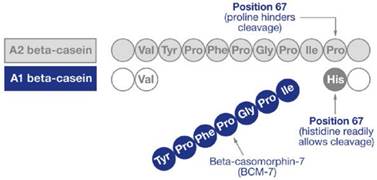
The A2 Milk Case: A Critical Review
Truswell AS
This review outlines a hypothesis that A1, one of the common variants of beta-casein, a major protein in cows’ milk could facilitate immunological processes that lead to type I diabetes (DM-I). It was subsequently suggested that A1 beta casein may also be a risk factor for coronary heart disease (CHD), based on between-country correlations of CHD mortality with estimated national consumption of A1 beta-casein in a selected number of developed countries. A company, A2 Corporation was set up in New Zealand in the late 1990s to test cows and market milk in several countries with only the A2 variant of beta-casein, which appeared not to have the disadvantages of A1 beta-casein. The second part of this review is a critique of the A1/A2 hypothesis. For both DM-I and CHD, the between-country correlation method is shown to be unreliable and negated by recalculation with more countries and by prospective studies in individuals. The animal experiments with diabetes-prone rodents that supported the hypothesis about diabetes were not confirmed by larger, better standardized multicentre experiments. The single animal experiment supporting an A1 beta-casein and CHD link was small, short, in an unsuitable animal model and had other design weaknesses. The A1/A2 milk hypothesis was ingenious. If the scientific evidence had worked out it would have required huge adjustments in the world’s dairy industries. This review concludes, however, that there is no convincing or even probable evidence that the A1 beta-casein of cow milk has any adverse effect in humans. This review has been independent of examination of evidence related to A1 and A2 milk by the Australian and New Zealand food standard and food safety authorities, which have not published the evidence they have examined and the analysis of it. They stated in 2003 that no relationship has been established between A1 or A2 milk and diabetes, CHD or other diseases.
A1 / A2 Milk – What is the truth?
 Description: Nutrients 07 05339 g001 1024 Sandra Zoghbi and others, a scientist group from France and Spain have worked on possible effects of A2 milk consumption. Their study was direct in that they used the product which is presumably produced once A2 milk is digested in the intestine. The product is called beta-casomorphin-7 (as it has seven amino acids). Such a product will not be produced when A1 milk is consumed as a critical amino acid is missing. They used intestinal specialized cell lines that are known to produce mucin, a substance which provides protection to the intestine and also eliminates pathogens by entrapping them in its thick jelly like secretion. It is known that people that have reduced mucin secretion capacity suffer from chronic enteric ailments. The group found that when these isolated cell lines were exposed to the purified beta casomorphin -7, it led to increased production of mucin. This also led to enhanced expression of mucin secretion markers. The authors conclude that the A2 milk product beta casomorphin, in fact, could provide protection to intestine in the newborn as well as adults (Extracted from Sandra Zoghbi and others (2006) β-casomorphin regulates mucin through a μ-opioid pathway, Am. J. Physiol. Gastrointest. Liver Physiol. 290: G1105-G1113)
Description: Nutrients 07 05339 g001 1024 Sandra Zoghbi and others, a scientist group from France and Spain have worked on possible effects of A2 milk consumption. Their study was direct in that they used the product which is presumably produced once A2 milk is digested in the intestine. The product is called beta-casomorphin-7 (as it has seven amino acids). Such a product will not be produced when A1 milk is consumed as a critical amino acid is missing. They used intestinal specialized cell lines that are known to produce mucin, a substance which provides protection to the intestine and also eliminates pathogens by entrapping them in its thick jelly like secretion. It is known that people that have reduced mucin secretion capacity suffer from chronic enteric ailments. The group found that when these isolated cell lines were exposed to the purified beta casomorphin -7, it led to increased production of mucin. This also led to enhanced expression of mucin secretion markers. The authors conclude that the A2 milk product beta casomorphin, in fact, could provide protection to intestine in the newborn as well as adults (Extracted from Sandra Zoghbi and others (2006) β-casomorphin regulates mucin through a μ-opioid pathway, Am. J. Physiol. Gastrointest. Liver Physiol. 290: G1105-G1113)
